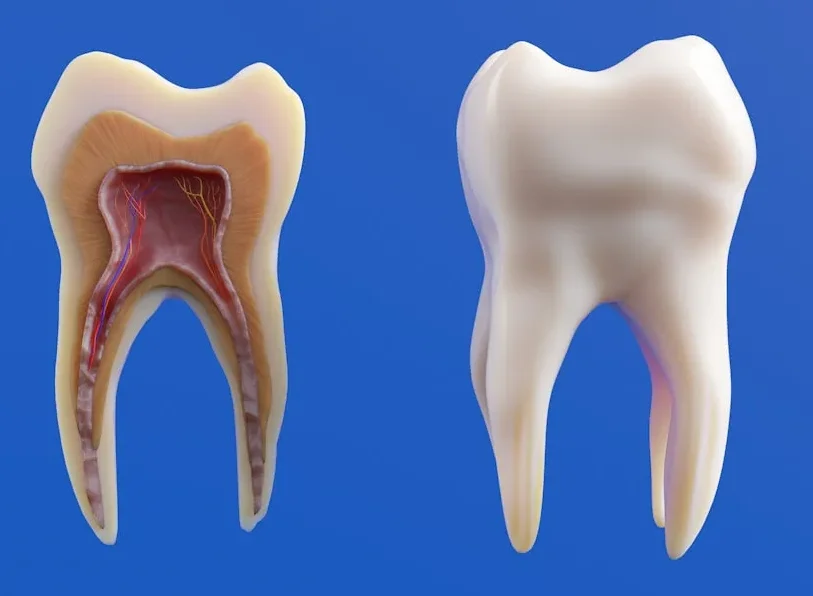Tooth sensitivity is a common dental problem that many people experience at some point in their lives. If you have ever asked yourself, “What causes teeth sensitivity?”, you are not alone. That sharp, sudden pain when drinking a cold soda or biting into ice cream can be uncomfortable and concerning.
Tooth sensitivity can range from mild irritation to severe discomfort, making it important to understand its causes, symptoms, and treatment options.
In this article, we will break down the causes of tooth sensitivity, tooth sensitivity symptoms, and what you can do to prevent and treat it.
What Causes Teeth Sensitivity?
The most common causes of teeth sensitivity are linked to worn enamel or exposed tooth roots. Enamel is the protective layer that covers your teeth. When it wears away, the dentin beneath gets exposed. Dentin contains tiny tubules that lead to the nerves of your teeth.
When these tubules are exposed, they can react to cold, hot, sweet, or acidic foods and drinks, causing sharp pain.
Here are the most common causes of tooth sensitivity:
- Tooth enamel erosion due to acidic foods and drinks.
- Gum recession that exposes the root of the tooth.
- Tooth decay or cavities that damage the protective layers.
- Worn fillings that no longer cover sensitive areas.
- Grinding teeth (bruxism) can wear down enamel.
- Dental procedures like whitening or deep cleanings may temporarily increase sensitivity.
Tooth Sensitivity Symptoms to Watch For
The main tooth sensitivity symptoms include sharp or sudden pain that happens when teeth are exposed to certain triggers. You might notice discomfort when:
- Drinking cold beverages (cold tooth sensitivity).
- Eating hot food or drinks.
- Consuming sweet or sugary items.
- Eating or drinking acidic foods like citrus fruits and soda.
- Breathing in cold air.
If you keep wondering, “Why does my tooth feel cold?”, this is a clear sign that your enamel may be thinning, or your gums are pulling back.
Common Triggers for Temperature-Sensitive Teeth
Many people struggle with temperature-sensitive teeth, where pain occurs only when exposed to hot or cold sensations.
Why Does My Tooth Feel Cold?
Cold sensitivity happens because the protective enamel or gums are no longer shielding the nerves inside your teeth. The exposed dentin allows cold sensations to travel quickly to the nerves, causing sudden discomfort.
Why Is My Tooth So Sensitive to Heat or Cold?
Your tooth may feel sensitive due to one of these reasons:
- Gum disease that exposes the roots.
- Cracked teeth allow temperature changes to reach nerves.
- Worn-down enamel from aggressive brushing.
- Recent dental treatments.
This kind of tooth sensitivity should not be ignored. If the pain becomes frequent or severe, it may point to an underlying dental issue.
Causes of Teeth Sensitivity Explained
Let’s look at the causes of teeth sensitivity in detail:
Acidic Foods and Drinks
- Sodas, citrus fruits, tomatoes, and vinegar-based foods erode enamel.
- Sodas, citrus fruits, tomatoes, and vinegar-based foods erode enamel.
Poor Oral Hygiene
- Not brushing or flossing properly leads to plaque buildup and cavities.
- Not brushing or flossing properly leads to plaque buildup and cavities.
Over-brushing or Hard Bristles
- Using hard toothbrushes or brushing aggressively wears down enamel.
- Using hard toothbrushes or brushing aggressively wears down enamel.
Teeth Grinding
- Chronic grinding thins enamel and causes micro-cracks.
- Chronic grinding thins enamel and causes micro-cracks.
Gum Recession
- Age or gum disease can cause gums to pull back, exposing roots.
- Age or gum disease can cause gums to pull back, exposing roots.
Dental Treatments
- Whitening procedures, deep cleanings, or braces adjustments may cause temporary sensitivity.
- Whitening procedures, deep cleanings, or braces adjustments may cause temporary sensitivity.
How to Relieve Cold Tooth Sensitivity
If you often ask yourself, “Why is my tooth so sensitive when I eat cold foods?”, there are several steps you can take to manage the discomfort:
- Use desensitizing toothpaste to block pain signals.
- Switch to a soft-bristle toothbrush to avoid enamel wear.
- Avoid acidic and sugary foods that worsen enamel erosion.
- Wear a night guard if you grind your teeth.
- Maintain regular dental check-ups to catch problems early.
When to See a Dentist for Teeth Sensitivity
Mild sensitivity may go away with better care, but persistent or severe pain needs professional help. Contact your dentist if:
- Sensitivity lasts for more than a few weeks.
- Pain is severe when eating or drinking.
- Only one tooth is highly sensitive, which may suggest a cavity or a cracked tooth.
- You notice bleeding gums or swelling.
A dentist can determine if the problem is due to tooth decay, gum disease, or enamel erosion, and recommend treatments like fluoride varnish, bonding, or gum grafting.
Preventing Tooth Sensitivity
The good news is that you can prevent most cases of sensitivity with good oral care and healthy habits.
Tips to Prevent Sensitivity:
- Brush gently with fluoride toothpaste twice a day.
- Floss daily to remove plaque.
- Avoid overuse of whitening products.
- Limit acidic and sugary foods.
- Drink water after meals to wash away acids.
- Get dental cleanings twice a year.
Simple changes in daily habits go a long way in protecting your enamel and gums.
Dental Treatments for Sensitive Teeth
Dentists may recommend different treatments depending on the cause of your sensitivity:
- Fluoride treatments to strengthen enamel.
- Dental bonding to cover exposed roots.
- Crowns or fillings for damaged or decayed teeth.
- Gum graft surgery for severe gum recession.
- Root canal in cases of extreme sensitivity caused by nerve exposure.
How Lincolnwood Family Dental Can Help with Tooth Sensitivity
Living with sensitive teeth can make eating, drinking, and even smiling a painful experience. At Lincolnwood Family Dental, we offer personalized care to find the root cause of your sensitivity and provide effective treatment.
Here’s how we can help:
- Thorough Diagnosis: Our dentists carefully examine your teeth and gums to identify whether enamel wear, cavities, gum recession, or another issue causes your sensitivity.
- Customized Treatment Plans: Depending on your needs, we may recommend fluoride varnish, desensitizing agents, bonding, or protective dental restorations to reduce sensitivity.
- Advanced Solutions: For more severe cases, treatments such as gum grafting or root canals can provide lasting relief.
- Preventive Care: We guide you with brushing techniques, recommend the right toothpaste, and create a plan to protect your teeth from further damage.
At Lincolnwood Family Dental, our goal is not only to relieve your current discomfort but also to help you maintain a healthy smile for the long term. If you’ve been asking yourself, “Why is my tooth so sensitive?”, our team is here to give you the answers and solutions you need.
Final Thoughts
If you are wondering, “What causes teeth sensitivity?”, the answer often lies in enamel erosion, gum recession, or underlying dental problems.
While some cases are temporary, persistent sensitivity may point to something more serious. Paying attention to tooth sensitivity symptoms, avoiding triggers, and getting timely dental care can protect your teeth and keep your smile healthy.
Tooth sensitivity should not be ignored. The sooner you address it, the easier it is to manage.
To know more, book your appointment today!









